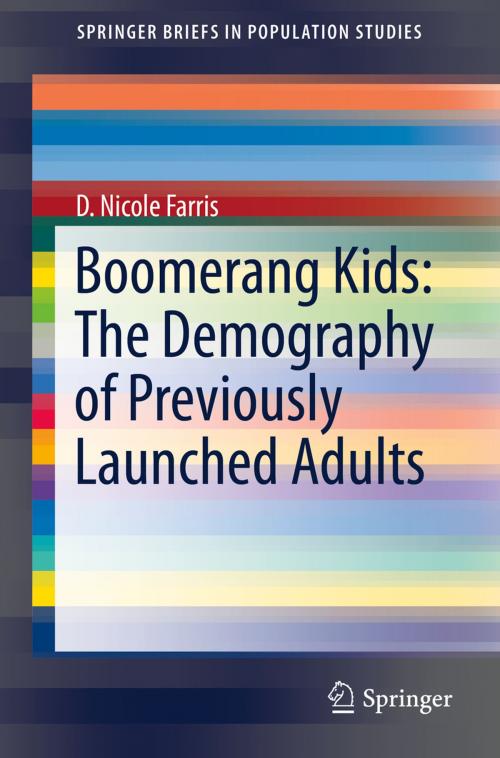Boomerang Kids: The Demography of Previously Launched Adults
Nonfiction, Social & Cultural Studies, Social Science, Demography, Sociology| Author: | D. Nicole Farris | ISBN: | 9783319312279 |
| Publisher: | Springer International Publishing | Publication: | April 25, 2016 |
| Imprint: | Springer | Language: | English |
| Author: | D. Nicole Farris |
| ISBN: | 9783319312279 |
| Publisher: | Springer International Publishing |
| Publication: | April 25, 2016 |
| Imprint: | Springer |
| Language: | English |
Combining statistical analyses and personal interviews, this book examines the phenomenon of adult children in the United States who have returned to living with their parents in the family home. It uses both data and narrative to fully detail how such co-residency has shaped this ever-increasing demographic group, who are often referred to as "previously launched adults" or " boomerang children." The author first presents quantitative research using data obtained from the National Survey of Families and Households. Readers will discover the various demographic, household, and economic variables that might lead an individual to move back in with his or her family. This statistical analysis is complemented by 50 qualitative interviews that offer a more in-depth look at the trend from the point of view of those who have experienced it. These interviews of both adult children and their parents cover such areas as personal background, the effects of returning to the parental home, and self-esteem issues. In addition, the book offers cross-country comparisons by looking at the prevalence of this phenomenon in China and Greece. It discusses the different cultural contexts in which adult child and parent co-residence is not seen as particularly deviant, as it is in America, as well as identifies some of the demographic and economic factors that would cause those in different countries to continue to live with their parents. This book furthers research into the sociological study of the family. The quantitative analyses describe the large scale trends and their implications, the interviews provide an important personal context, while the cross-country comparisons offer additional perspectives. Overall, readers will gain a complete picture of this unprecedented demographic shift in the United States, including important policy implications and the plight of young adults coming of age in the 21st century.
Combining statistical analyses and personal interviews, this book examines the phenomenon of adult children in the United States who have returned to living with their parents in the family home. It uses both data and narrative to fully detail how such co-residency has shaped this ever-increasing demographic group, who are often referred to as "previously launched adults" or " boomerang children." The author first presents quantitative research using data obtained from the National Survey of Families and Households. Readers will discover the various demographic, household, and economic variables that might lead an individual to move back in with his or her family. This statistical analysis is complemented by 50 qualitative interviews that offer a more in-depth look at the trend from the point of view of those who have experienced it. These interviews of both adult children and their parents cover such areas as personal background, the effects of returning to the parental home, and self-esteem issues. In addition, the book offers cross-country comparisons by looking at the prevalence of this phenomenon in China and Greece. It discusses the different cultural contexts in which adult child and parent co-residence is not seen as particularly deviant, as it is in America, as well as identifies some of the demographic and economic factors that would cause those in different countries to continue to live with their parents. This book furthers research into the sociological study of the family. The quantitative analyses describe the large scale trends and their implications, the interviews provide an important personal context, while the cross-country comparisons offer additional perspectives. Overall, readers will gain a complete picture of this unprecedented demographic shift in the United States, including important policy implications and the plight of young adults coming of age in the 21st century.















